Show 235: Listening Guide
From the Top’s broadcast for Show 235 was taped in the Kirkpatrick Auditorium at Oklahoma City University, on Sunday, May 15, 2011. We asked our performers to tell us about the music they performed on the show:
Randall Goosby, 14, violin
I. Allegro from Concerto No.3 in G major KV 216
By: Wolfgang Amadeus Mozart
This piece is very youthful. After all, Mozart was still a teenager when he wrote the concerto. In a lot of sections, I imagine children laughing and playing. I also like the minor section in the middle: it is a nice contrast from the rest of the movement, which is more cheerful.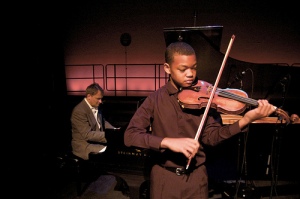
When I hear this piece, it doesn’t sound very difficult. The melody is very simple and playful. However, I found it difficult to get all the small details to come through (vibrato, speed, bow speed, dynamics). There are many different interpretations and the small details throughout the piece are what make everyone’s playing unique.
Post Show Reflection: My favorite memories from the show were meeting all the performers, getting to know them and performing with them. The show was a lot of fun! I really enjoyed playing with Chris O’Reilly. The audience was very friendly, which made it all a little easier. Everyone with From the Top was so nice and funny!!!
Music can do ANYTHING! Music can cheer someone up, make them sad, or just relax them.
Victoria Young, 11, piano
I. Bourree, II. Sarabande, and III. Gigue from French Suite No.5 in G Major, BWV 816
By: Johanna Sebastian Bach
I have many thoughts on my piece of music. When I play the piece, stories and scenes pop into my mind. In the Bouree, I imagine a grand, party with confetti flying around, and it’s busy and noisy. The right hand holds a Q & A theme while the first 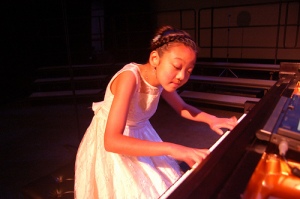 beat is a question and the second an answer. The Sarabande casts a sacred feeling. It shows a lonely man sitting outside quietly in a calm scene with memories returning to him. In the Gigue, I see a lively dance with happy couples moving around an elegant, baroque-style room.
beat is a question and the second an answer. The Sarabande casts a sacred feeling. It shows a lonely man sitting outside quietly in a calm scene with memories returning to him. In the Gigue, I see a lively dance with happy couples moving around an elegant, baroque-style room.
The unique thing about my piece is the different voices throughout and its dance-like quality. One hard thing to nail is the presentation of the voices altogether. I think of these as quartets consisting violins, violas, cellos, and basses. The cellos and basses play the low sustaining harmony. Violas are a more hectic, higher harmony. The violin leads with the melody, the highest. Still, sometimes that flips! Cellos and basses play the melody, violins the harmonies, etc.
Post Show Reflection: My favorite memory from the three days was my interview with Christopher O’Riley on stage. It was better than the rehearsal and I felt very confident. I enjoyed talking to Mr. O’Riley and liked the audience’s laughter. I also loved the moment that I played. I performed freely with full enjoyment and expressed my interpretation and feelings of the music to the audience.
Music can excite the audience and make them want to dance, yet it also makes a calm, or even, sorrowful, feeling.
Noah Dugan,16, trumpet
I. Allegro Moderato from Concerto in F Minor, Op. 18
By: Oskar Bohme
To me, Oskar Bohme’s trumpet concerto is just a piece that is impossible not to fall in love with. When I play the Bohme, I try to tell a story. Usually, the story I try to depict is fixated around the life of Oskar Bohme. Bohme was born near Dresden, Germany in 1870. He studied at the Leipzig Conservatory. After 2 years of trumpet playing in the Budapest Opera Orchestra, he moved to St. Petersburg, when he was a very successful pedagogue, composer, and soloist.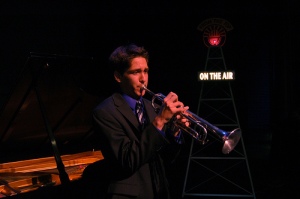 In 1936, Bohme, because he was a German, was exiled by Stalin to Orenburg, where he is said to have died in a labor camp. This piece is big, Russian, and Romantic. It’s a lot of fun to play.
In 1936, Bohme, because he was a German, was exiled by Stalin to Orenburg, where he is said to have died in a labor camp. This piece is big, Russian, and Romantic. It’s a lot of fun to play.
The Bohme Concerto presents many challenges. There are fast runs and soaring lyrical passages; it is a rousing crowd pleaser. It’s not as hard as the Jolivet Concertino that I played at the National Trumpet Competition, but it’s still plenty challenging. I try to wring as much drama from the piece as possible.
Post Show Reflection: My all-time favorite part of the trip was the incredibly large sigh of relief after finishing the show; bright lights, dozens of mics and a rowdy crowd. It was easily the most exciting performance of my life.
I believe that music has the power to open doors for people, and to inspire them to believe that there is good in this world.
Anne Richardson, 14, cello
I. Lebhaft, sehr markiert and V. Massig schnell from Sonata for Solo Cello, Op.25, No.3
By: Paul Hindemith
I don’t really think about the actual piece while I’m playing. Instead, I think about the feeling. Hindemith is angry and strict, so I put myself in the shoes of someone who’s furious, but not dramatic. 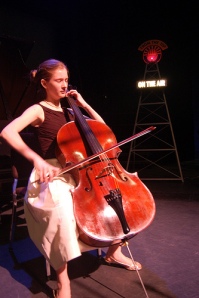 When I listen to movements I. and V., I think of either a marching army, or a twisted Picasso painting. Sometimes when I listen to the last movement, I think how funny it could be if somebody danced to it, since there is somewhat of a waltz in the middle of the piece.
When I listen to movements I. and V., I think of either a marching army, or a twisted Picasso painting. Sometimes when I listen to the last movement, I think how funny it could be if somebody danced to it, since there is somewhat of a waltz in the middle of the piece.
Hindemith is one of the only pieces that I’ve played that has almost no subtleties. Every detail is loud and outspoken. I try to communicate that to the audience without screaming in their face the whole time.
Post Show Reflection: My favorite memory was the actual performance. I love doing a live performance. When I go out on the stage, the lights calm me down; the lights blind my fear. It’s the most amazing feeling, I love it genuinely.
Music has the ability to melt away the hard shell of people. It can make people laugh or cry. Music is an adventure. Every time one listens to it, they discover something new.
Norman North High School Chorale (59 members, Ages 15-18)
Tony Gonzalez, Director
Water Night
By: Eric Whitacre
Eric Whitacre’s arrangement of Octavio Paz poem “Agua Nocturna” was composed in 1995, and remains today among the most popular works in American choral music. The sequences of images in Water Night are vividly captured in the sound painting that includes tonal clusters, some containing as many as fourteen tones.
The choir feels a strong connection to the music through the poetic imagery and the power of the composer to capture the subtlety and the passion of these images. It was a challenging piece to learn due to the harmonic complexity, stacked chords, and intonation demands. Some of our choir members met Mr. Whitacre in 2009 at the ACDA convention, have conveyed to the choir his persona l and giving nature. This message gives special meaning to the composer and his music.
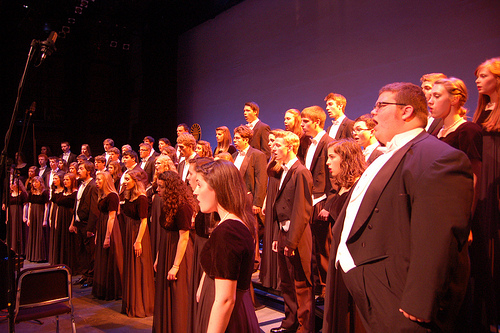
Chris Carbin, 18, Baritone
Water Night
By: Eric Whitacre
Post Show Reflection: The rehearsal the night before the recording was simply mind-boggling. I was expecting to see talent, of course; but what I witnessed were some of the most competent performers I’ve ever seen. I feel absolutely blessed to have been in the presence of these young musicians. It was magnificent to perform for an audience whose respect for music equals your own.
As stereotypical as it sounds, I know that music has the owner to change the world. The emotions that music has stirred within me can, and have, changed the direction of my life and there is no reason if can’t do the same for others.
Kate Ocker, 18, Soprano
Water Night
By: Eric Whitacre
Post Show Reflection: My favorite memory from the three days was the arts leadership conference the morning after the show. Performing on that stage was both amazing and terrifying.
Music can change the world one instrument a time.


